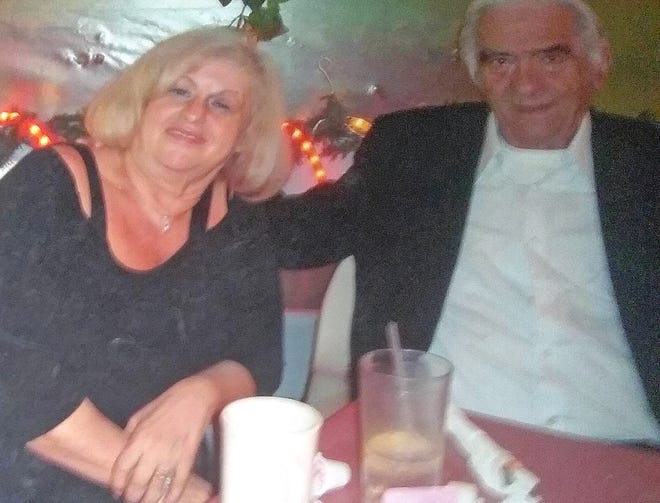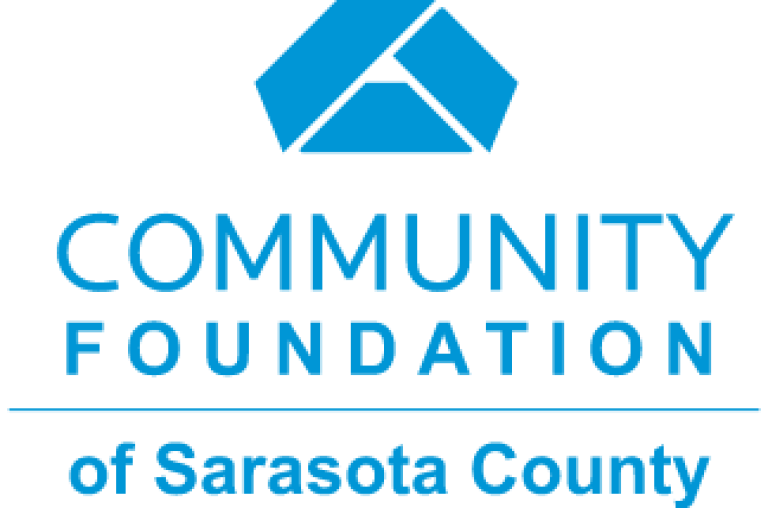November 16, 2022
Suddenly alone: Season of Sharing helps Sarasota woman on a new path in retirement
Categories: Stories of Impact, COMMUNITY CARE: Placemaking: Housing, Transportation & Economic Support, COMMUNITY CARE: Preventing Homelessness, Season of Sharing,

Agnes Hollander, 75, of Sarasota, with her late husband Frank. PHOTO PROVIDED BY AGNES HOLLANDER
They fell in love with Florida together.
Like many retirees, Agnes Hollander moved to the state as part of a couple – with her husband, Frank, ready to start a new chapter of their lives.
In the Sarasota area, the Hungarian-American pair discovered the best of all worlds: Perfect weather for Frank, an avid soccer player. Great restaurants and a vibrant music scene, which they’d loved in New York.
Frank bought an electric piano for their home, always nudging Agnes to play – something she was too shy to do in public, despite her conservatory training.
Soon they became regulars at the jazz clubs.
It was at a Venice piano bar in 2013 that they’d make a fateful call, as a storm raged outside.
She remembers it like yesterday – the moment that would change her life, sending her on a path to navigate a pandemic, a housing crisis and the pitfalls of retirement alone.
Walking alone
Frank and Agnes were listening to the music when they heard heavy rains thrashing the bistro’s ceiling.
“Oh, my God, the skies have opened up!” Frank said. He worried about getting them home safely. Agnes wondered if they should wait. Maybe the storm would pass.
“No, let’s get out of here,” Frank said, hoping to leave before it got worse.
Agnes peered nervously through the windshield as Frank drove through the torrential downpour – sheets of rainwater ferociously dousing their Mustang, rendering the wipers useless.
Suddenly, seemingly out of nowhere, another car veered into their lane. Before Agnes could catch her breath, Frank was jerking the wheel to the right – sending the Mustang slamming into a ditch and a power pole.
'I paid my bills but had nothing left'
Agnes pushed through the ensuing years of shock and sorrow by continuing to work.
Aside from two cousins in Hungary, she had no family left – no children, no siblings, her parents long deceased.
“I was alone,” she said. “It’s just me.”
Her job left her busy and around people – which she loved. It also kept her head above water as rents began to soar.
While she and Frank once had paid $650 a month for a two-bedroom apartment in Sarasota, by 2020 she had moved a few blocks away into a one-bedroom going for $900 a month.
Nearing 70 at that point, Agnes was like many older Americans – working later in life.
But when the COVID-19 pandemic hit, that option all but closed. The travel agencies for which she worked shut down, some for good, others later re-opening remotely with pared-down staff.
Agnes fell back on her sole sources of income: her Social Security check for $1,800 a month, plus about $600 a month from Frank’s pension.
Living expenses – food, gas and other bills – were taking bigger and bigger bites.
Then in January, her landlord raised the rent – from $900 a month to almost $1,400.
“Without my husband, it’s tough,” she said. “I paid my bills but had nothing left.”
'Aging into poverty'
In that way, she was not alone.
Nationwide, millions of women, particularly those single or widowed, are "aging into poverty," studies show.
That’s in large part due to inequities in women’s earnings, Social Security and other retirement benefits as well as longer lifespans compared to men.
For Agnes, things turned from bad to worse in July.
First, the air conditioning in her car broke down. Estimates put the price of repairs at $1,500. A musician friend took the car to his own mechanic – paying the $350 bill.
“I was so embarrassed. I didn’t have to do this before,” she said. “I always had enough money to cover myself.”
Through all this, Agnes polished off her resume to look for jobs.
Then along with the car repair, the news got worse. Phoning New York, she learned that Frank’s pension was wiped out. Something about a “lump-sum payment” and losses in the stock market. She didn’t understand it all. But the money was gone.
Now she only had $1,800 in Social Security to live on – paying $1,400 of that in rent.
“I was almost panicking, I couldn’t sleep at night,” she said. Shut-off notices were piling up.
Swallowing her pride, she turned to her rabbi and his wife. Where might she seek assistance, she asked, humiliated.
“They kept saying, ‘Don’t worry, we’re family.’”
'They are used to giving help'
Through them, Agnes learned of JFCS of the Suncoast.
There, Susan Schoengold, coordinate of Jewish Financial Assistance and Jewish Care Management, turned to something that could help Agnes get caught up – Season of Sharing.
“Their spirits are unbreakable,” Schoengold said of Agnes and her generation. “They are not used to asking for help. They are used to giving help.”
Yet the housing crisis is testing even the most resilient of the people she works with, Schoengold added. In the past, Season of Sharing’s aid could easily right a person’s ship after a one-time blip or setback. Now the housing crisis is threatening to sink many households.
“This is a mega blip,” Schoengold said.
Agnes is grateful to both Season of Sharing and to Schoengold, who called her repeatedly to check on her.
The assistance gave her breathing room, she said.
Long term, though, she’ll continue to look for another place to live – and a job.
But she's trying to be realistic.
Now 75, she has to limit time on her feet – the accident leaving her knee permanently damaged and walking with a limp.
“Who’s going to hire me?” she said.
Her sister-in-law is encouraging her to move to Hungary. She’s thought about it – joining a growing number of Americans retiring abroad to escape skyrocketing costs of living and health care.
But the United States has been her home since she was a teenager.
“I feel more American,” she said. “At my age, it’s not easy to restart your life.”
Besides, her tight group of musician and entertainment friends is here.
They meet several times a month at various piano bars and clubs to support friends' gigs.
Her 99-year-old tap-dancing friend will call her ahead of time, asking to be picked up.
Agnes still has the electric piano that Frank bought her. But it sits in her apartment, mostly unused after his death.
“Since he’s gone, my heart isn’t there anymore,” she said.
With her bubbly personality – calling dear ones “darling” and inviting them into her fold – there will always be room for more friends. But no one will take Frank’s place.
“I miss him,” she said. “I don’t think I’m going to find anybody else.”
See the full story, as it originally appeared in the Sarasota Herald-Tribune on Nov. 16, 2022, here.
